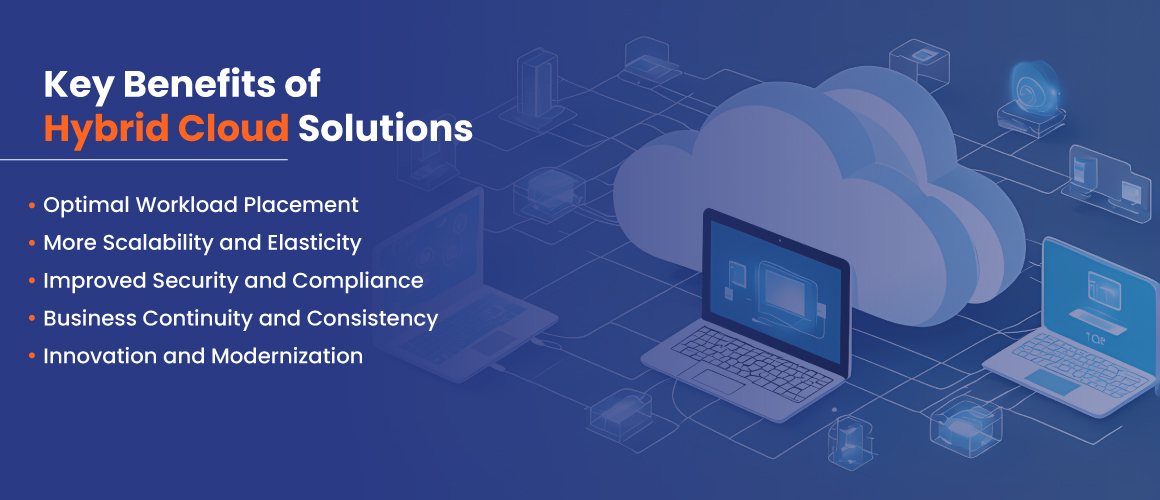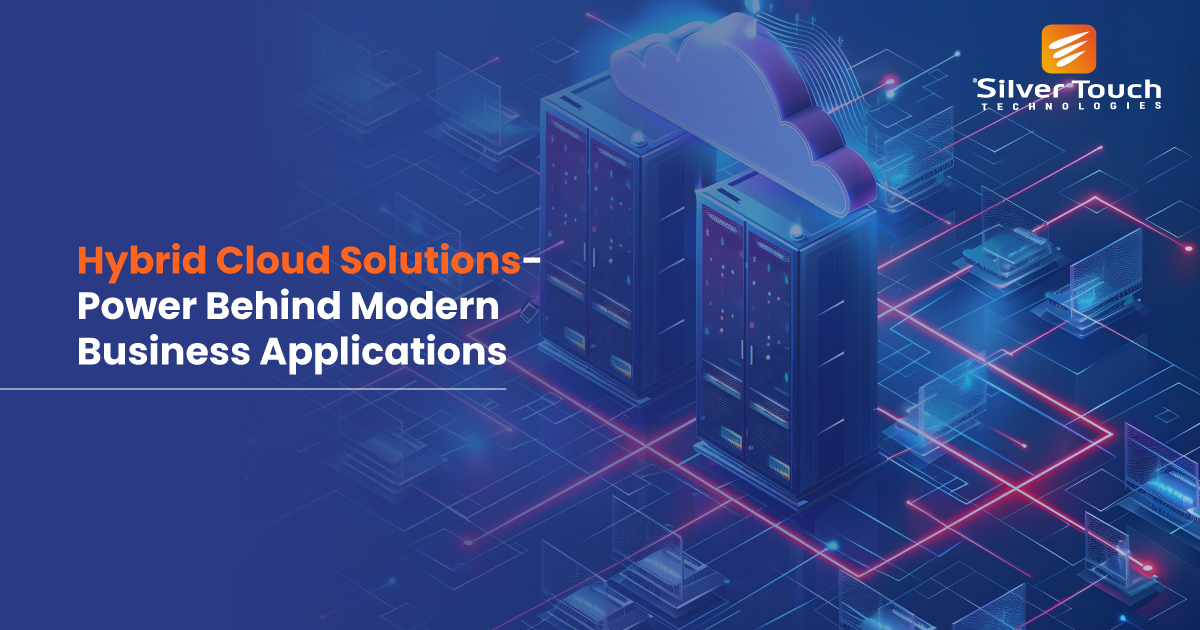Technologies evolve rapidly in this digital era, pushing companies to seek scalable and agile IT solutions like applications and software. Here, hybrid cloud emerges as a robust and cost-efficient approach. It combines the strengths of both private and public cloud environments. Companies can take assistance from the best cloud consulting service provider to get the benefits of hybrid cloud including more flexibility, scalability, and effective digital transformation.
This post talks about the top benefits of hybrid cloud and some key challenges related to this concept. Let’s begin with discussing the paradigm shift of IT infrastructure from traditional to hybrid architectures.
Paradigm Shift from Traditional IT to Cloud-Native and Hybrid Architectures
Traditional IT infrastructure involves on-premise data centers with fixed infrastructure, manual operations, vertical scaling,and limited agility for applications. Here, business applications are typically large, single-tier systems with tightly integrated components. A change in one part of the application can lead to redeployment of the entire system. It also increases the risk of downtime. Here, cloud-native and hybrid architectures come to rescue.
The paradigm shift of IT infrastructure from traditional to cloud-native and hybrid architectures offers many benefits to business applications. On one hand, cloud-native architectures offer the advantage of cloud technology, and on the other hand, the hybrid concept gives the best of both worlds. Cloud-native development integrates DevOps practices and offers horizontal scaling to business applications with high resilience and self-healing facilities.
Hybrid architectures combine on-premise data centers (private cloud) with one or more public cloud environment. It creates a unified yet flexible and scalable IT environment. It can give the benefits of both public and private cloud concepts. Let’s dig deep into the importance of hybrid cloud in modern business applications.
Why Hybrid Cloud is Critical for Modern Applications
Hybrid cloud can maintain a subtle balance between flexibility and control cost-effectively. In today’s competitive business scenario, it is crucial to have robust and resilient business applications to respond customer demands quickly. Moreover, these business apps must be highly scalable and adhere to stringent regulatory requirements.
Though public cloud offers scalability, it may not fulfill compliance requirements effectively. On the other hand, a purely on-premise or private cloud model might offer complete control over data but it lacks the agility and scalability. Modern applications need the combination of both, and hybrid cloud has emerged as their effective solution.
Furthermore, cloud managed services assist companies to drive innovation and digital transformation by offering a hybrid way for modernization. Many modern applications have features based on future-ready technologies like AI and machine learning. In such a scenario, hybrid cloud can meet diverse requirements of these applications cost-effectively.
Key Benefits of Hybrid Cloud Solutions
Hybrid cloud solutions offer an array of business benefits to modern enterprises addressing their diverse needs. These solutions enable companies to achieve an optimal balance of control and flexibility. Here are the top benefits of hybrid cloud solutions

Optimal Workload Placement
It is the most significant benefit of hybrid cloud solutions. These solutions enable businesses to keep different applications and data in the most suitable environment as per their specific requirements. It also helps companies avoid ‘one-size-fits-all’ approach.
More Scalability and Elasticity
The public cloud provides enterprises with unparalleled scalability. It can handle high traffic during peak demand or seasonal flucutrations. Companies can rapidly scale their resource up or down as per the requirement using the public cloud approach.
Improved Security and Compliance
These solutions empower companies to maintain a high level of security. It enables enterprises to keep sensitive data in the secure private cloud. Less sensitive operations can benefit from the advanced security measures of public cloud, meeting compliance.
Business Continuity and Consistency
Hybrid cloud enhances business continuity and disaster recovery capabilities significantly. It can replicate data and workloads across private and public cloud environments to establish powerful failover mechanisms. It drives consistency with minimal downtime.
Innovation and Modernization
Hybrid cloud solutions promote innovation and modernization in existing IT infrastructure. These solutions facilitate modern businesses to migrate or refactor legacy applications with new cloud-native applications with more capabilities.
However, hybrid cloud solution pose some challenges, and companies should address them properly to leverage these benefits.
Challenges Related to Hybrid Cloud
Interoperability and integration complexity are the most important challenges for hybrid cloud solutions. It is imperative to connect disparate private and public cloud environments seamlessly. However, it needs robust networking, compatible data formats, and standardized APIs. As a result, cloud managed service providers need to integrate various platforms with different security protocols and operational models.
Another big challenge is data synchronization and migration between environments. It is particularly complex and cumbersome for large datasets or applications with strict regulatory requirements. The cloud solutions provider has to establish consistent identity and access management (IAM) across public and private domains. Apart from these hurdles, companies need to work on governance, cost management, and filling skill gaps for effective deployment.
How Cloud Managed Services Offer Flexibility to Move Workloads
Cloud managed service providers offer high flexibility to move workloads of your company between different environments like on-premise or private cloud and public cloud. They use a combination of standardization, automation, expertise, and specialized tools.
Managed service providers use containerization technologies like Docker and container orchestration platforms for application portability. Containerized workload can run consistently on different platforms. They also implement standarized IaC practics and leverage automation tools for ensuring consistency across different environments.
Apart from these ways, cloud managed services involve specialized tools for workload mobility and data synchronization. Expertise and experience of a cloud consulting services provider can identify workload dependencies and manage data gravity challenges using data replication and synchronization.
Tools & Technologies Useful for Hybrid Cloud
Successful hybrid cloud implementation needs a comprehensive suite of tools and technologies. The best cloud consulting service provider can combine these tools and technologies for enabling seamless operation and management. Containerization platforms like Docker and orchestration tools like Kubernets remain at the core of application portability and deployment.
Infrastructure-as-Code (IaC) solutions like Terraform and Ansible automate the provisioning of resources across private and public cloud environments. They ensure consistency and reduce the chances of human errors. Software Defined Networking (SDN) solutions, VPNs, and other related tools are useful for constant connectivity and secure data transfer.
Furthermore, hybrid cloud management platforms (HCMPs) from different providers can offer unified visibility and governance with automation capabilities across the cloud environment.
Future of Hybrid Cloud
Integrated and autonomous IT landscape will be the future of hybrid cloud. Better and more effective convergence of hybrid cloud with edge computing will extend its capabilities. AI and machine learning will remain at the core of cloud managed services and companies will use them for ensuring security with anomaly detection (AIOps). We can also expect more penetration and prevalence of cloud-native development services across the hybrid culture.
Concluding
Hybrid cloud offers many benefits to modern businesses. Increased scalability, agility, and optimum workload placement are some of the key benefits that assist companies to drive growth. However, modern enterprises need to address several major challenges related to hybrid cloud implementation to get its advantage. The best cloud consulting service provider can enable companies to overcome these challenges and leverage the benefits of hybrid cloud.
Silver Touch Technologies Canada is a reputed and renowned cloud consulting service provider. We offer top-notch cloud managing services for SMEs and large companies. Contact us to learn more about the scope of hybrid cloud solutions for your enterprise and get the most suitable solution that drives growth.
FAQs
A hybrid cloud combines on-premises infrastructure (private cloud) with public cloud services, while a multi-cloud involves using services from two or more public cloud providers without including a private cloud component.
Businesses prefer a hybrid cloud for modern applications as it is flexible and offers more control over sensitive data on-premises. Moreover, it offers more scalability and agility like the public cloud while facilitating gradual modernization.
Applications with strict regulatory or compliance requirements (where sensitive data stays on-premises), workloads with fluctuating demands that benefit from “cloud bursting” to the public cloud, and applications requiring low latency or edge computing are best suited for a hybrid cloud.
Yes, hybrid cloud can be secure, but it requires careful planning and robust security measures that consistently span both private and public environments.



